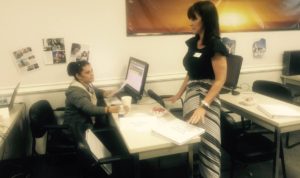
Presented by Cultivation Capital
BlueStrata EHR: The Unique Realities of Late-Stage Entrepreneurial Success

Tony Coco, President BlueStrata EHR, an electronic health records software provider, has entrepreneurship and success in his genes as his family has owned many small businesses throughout the years.
He also worked as the leading sales executive taking a $3-4 million company to $120 million before it was sold.
EQ sat down to speak with him about the beginning of BlueStrata, where the company is now and the challenges that come with running a late-stage startup.
Talk about the beginning of BlueStrata EHR?
BlueStrata started in 2012 with the mission to build software for skilled nursing homes.
We have a built-for-purpose product that enables skilled nursing homes to run their entire facility. It’s essentially an ERP (Enterprise Resource Planning) platform for skilled nursing homes.
What is a skilled nursing home?
Long-term care is different than hospitals, physician practices or other types of practices.
It’s a specific industry that covers independent living, assisted living, home health, adult daycare and skilled nursing. That would be the long term care continuum.
A senior migrates from their home into independent living. If their health deteriorates and they need more care they can transition into assisted living. Skilled nursing homes are for those residents in need of a higher level of care for temporary and/or permanent conditions.
Why this market?
The vision goes back to before [my time] since I joined the company in 2014.
One of the key drivers is what has happened in the industry, as in many industries, a transformation of client-server style software products over to web-based products. The big impetus was the opportunity to be a leader in bringing an SaaS (Software as a Service)-model business to this space.
What makes BlueStrata’s design unique? Who are your competitors?
Our biggest advantage is that our product is built on a single platform and is designed with long-term care facilities in mind. Many of our competitors have bought other companies over the years and tried to mash those products together which can make it challenging for the customer.

Our main competitor is, like us, a web-based product. Our largest advantage is that we developed a “high touch” model to help skilled nursing homes implement their product.
In the high touch environment we provide the project management, training, implementation and expertise in helping them get the software working in their nursing homes. That seems like a pretty simple idea, but delivering on that promise can be tough and it’s where we excel.
In many skilled nursing homes the staff is really good at the jobs they have been trained to do, which is providing quality care. At the end of the day, many users are not computer savvy, so our expertise in this area is very valuable.
I like to think of our team as the sherpas in the process—we help them get to the top of the mountain.
What is your biggest entrepreneurial challenge with this late stage startup?
Today, and I’m sure you hear this a lot, it’s scaling up in the most effective manner. It’s the timing of finding and hiring the right people and making sure they have the tools to do their jobs.
Of course you need to balance this with bringing in customers at the rate needed to grow and fund the business as you bring on that new talent.
That’s a balancing act that I think continues with any business, but it’s an additional challenge because as a younger business we’re managing cash more closely than most. One or two people can make a big difference in the P&L.
And success?
It’s our fast rate of growth. We have won some large deals that we’re currently working to implement today.
During the time I’ve been with the business we’ve actually tripled revenues and they continue to grow at a nice rate. Previously, we were selling to 1, 2 and 3 nursing homes at a time. Now, we’re working with some customers in Texas now who own 20-80 nursing homes.
I also really enjoy watching the people grow with the business. We bring somebody in that’s kind of new to software, or maybe a little early in their career and just watching them grow as the company grows, broadening their horizons, has really been a satisfying accomplishment.
In fact, we’ve hired some nurses from the skilled nursing homes to come in and do training and implementation who have been great additions to the team.
It’s also very satisfying to watch a customer complete their implementation. Our system brings a lot of value to their organization and when the system hits “go-live” it’s from all of the hard work delivered by both teams.
How does your temperament translate into making you a good entrepreneur?
For me, it’s going to play every day. I don’t want to call it a game, because it is serious business, but it is really about lacing up your shoes every morning and being willing to take on everything by the time you walk in the door, and that’s something that I just really enjoy.
When you talk about level of engagement and intensity, with a small company like this, it’s always there. I joke with other entrepreneurs about it—you come in the door with your to-do list ready to go, and by 8 o’clock you’re tearing that up because your priorities have all changed.
What makes St. Louis a good place for BlueStrata?
St. Louis is a great place because of the people. In my opinion, Midwesterners have a very good temperament for any service business, especially in long-term care in the health industry.
To do a good implementation of software you have to be able to get things done, but you also have to be a very good listener. The St. Louis community has cultivated a very strong base of people here that gives them some inherent skills to do that work.
I also think we’ve got a nice dynamic going on with all the venture capital companies and other benevolent individuals who have supported the startup and tech company mentality in St. Louis. It’s attracting a lot of talent and attention and offering great opportunities to the next generation.
What advice would you give to entrepreneurs interested in starting businesses in the healthcare tech space?
There is so much that the health care industry needs today to help facilitate what they’re trying to do electronically. There is plenty of opportunity to develop adjacent products whether in long term, acute care or other areas that could prove to be really useful to the user.
There is also a lot of engagement and activity in the investment community in trying to make that happen. I think the opportunity in Health IT is huge right now. It’s a great place to be.




